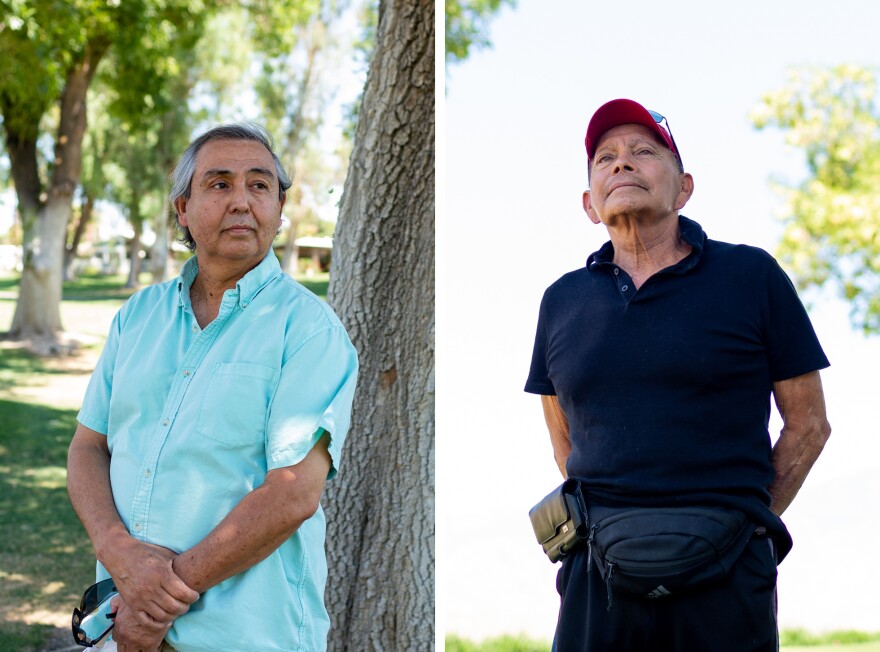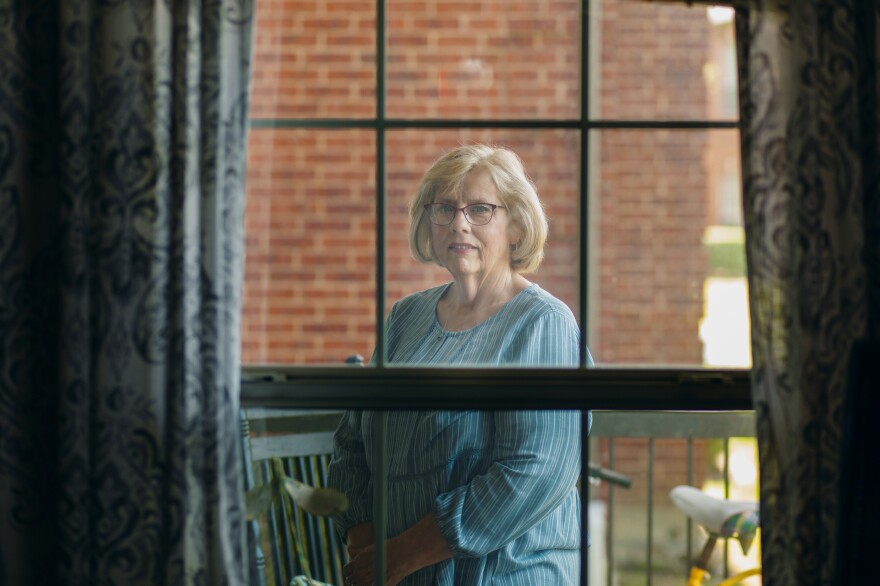It wasn't candlelight and soft music that made the 40th anniversary of Luann and Jeff Thibodeau so memorable. It was gazing at each other through the window of Jeff's nursing home in Texas and eating carryout from the Olive Garden. Just the two of them. And a nursing assistant.
"She fed him, and I ate mine, and that was it," Luann Thibodeau says. "So that was our 40th wedding anniversary."

The Thibodeaus have not been in the same room since mid-March. That's when visitors were banned from nursing homes to slow the spread of the coronavirus. But family members say that talking via FaceTime and holding up signs at windows are no substitute for the hands-on care and emotional support their visits provide.
Family members often are an integral part of the care residents in nursing homes receive. They make sure meals are being eaten, clothes are being changed. They also offer invaluable emotional support.
Without it, the consequences can be dire. NPR spoke to several families about what's happened since the mid-March visitor ban. All reported seeing shocking declines in their loved ones.
Advocates for residents say it's time to rethink the outright ban.
Nursing homes can permit visitors for "compassionate situations." But that's usually interpreted as meaning end-of-life visits. Robyn Grant, public policy director for the National Consumer Voice for Quality Long-Term Care, says that compassionate care needs to be interpreted more broadly.

"Residents are declining mentally, physically," she says. "We think that those situations are times when family members should be permitted."
Luann Thibodeau has seen that decline in her husband. She used to bring dinner for him every night except Tuesdays when she goes to Bible Study. She says that as his multiple sclerosis has worsened, he's become increasingly disinterested in food.

"I bully him into finishing a meal. And I'll say to him, 'Jeff, you know, this is what an adult man eats. So you need to eat this.' "
A staff member can't do what she does. Nursing home residents have rights. So if Jeff Thibodeau tells a nursing assistant that he's done eating after three bites, she has to abide by his wishes.
Without his wife's push, the results of her absence is striking.
"When I see him at the window, I can tell his clothes are way big on him," Luann Thibodeau says. "And I'm pretty sure he's lost significant weight."
And while family members are locked out, residents are locked in. It didn't used to be like that. Luann Thibodeau would take her husband to church on Sundays and to the movies. They'd go out for fast food. But she says since the lockdown, his anxiety has increased. Sometimes he's called her 10 times in a day.
"He would say, 'Why aren't you here? Why don't you come in? Nobody will know,' " Luann Thibodeau says. "And he was strategizing how I could sneak in the front door. I could sneak in the back door and come see him. And so that's been really hard."

It's also been really hard for Eva Gonzalez, a 98-year-old resident of a Southern California nursing home. She was used to daily visits from her sons Sky and David.
"She probably feels that we've abandoned her," Sky Gonzalez says.
Eva Gonzalez lived on her own until about 18 months ago. Then she started having falls and symptoms of dementia. She needed 24-hour care. But now that Sky can only reach her on the phone, he can't see what kind of care she's getting.
"When I call, she always seems to be dehydrated," he says.

She tells him she needs water. Nursing home staffers tell him they check on her every hour. "But how do I know what's going on or not going on?" he asks.
Yet calling his mom directly just seems to make things worse.
"She became more agitated, wondering, well, 'Where are you? Why aren't you here? Come get me out of here,' " he says.
He begins to weep. "My calls were just creating more stress for her."

Banning all nonessential people from nursing homes may have been a wise move at the beginning of the COVID-19 outbreak. But now the policy needs to be reconsidered, says Tony Chicotel, a staff attorney with California Advocates for Nursing Home Reform. For one thing, the ban hasn't kept COVID-19 out of nursing homes.
"The virus finds its way into the building through whoever is coming in, whether it's staff or visitors," Chicotel says.
The coronavirus is likely to keep finding its way into nursing homes as long as it's still in the community at large.
The Centers for Medicare & Medicaid Services have published guidelines for how nursing homes might reopen to visitors. Agency administrator Seema Verma confirmed in a conference call with reporters this month that it would be up to state and local leaders to set the rules.
Chicotel says his organization has a proposal he believes would work right now.
"For those family members who provide more than just companionship, who really provide support to that person's quality of life in ways that the staff probably just can't, those family members should have access to residents as long as they follow the same safety protocols that the staff are following," Chicotel says. Those protocols would include wearing personal protective equipment and daily temperature checks.

Nancy Snider would have gladly done so. Her husband, Matt, was in a Michigan nursing home for years with Huntington's disease.
"It's one of the worst diseases someone can have," she says. "And he's battled it like a warrior for all these years."
Either she, her daughter or a close family friend saw Matt every day. They performed a lot of tasks that most people would think were handled by the staff.

"We'd go in and if his shirt needed to be changed or his bedding wasn't changed or if he still had some food from breakfast on his face, we would do that," Nancy Snider says. "Just basically anything."
Without that help and human contact, her husband's decline was stunning. His weight dropped to about 90 pounds.
"The fact that no one called me about the change in his condition has really irritated me because it's cost me time. It's cost my family time with him," Nancy Snider says. "It's too late now. He's actively dying."
Shortly after we spoke, she moved him to a hospice facility that allowed family visitors. He died a few days later, with his wife and his daughter holding his hands.
Copyright 2021 NPR. To see more, visit https://www.npr.org.




